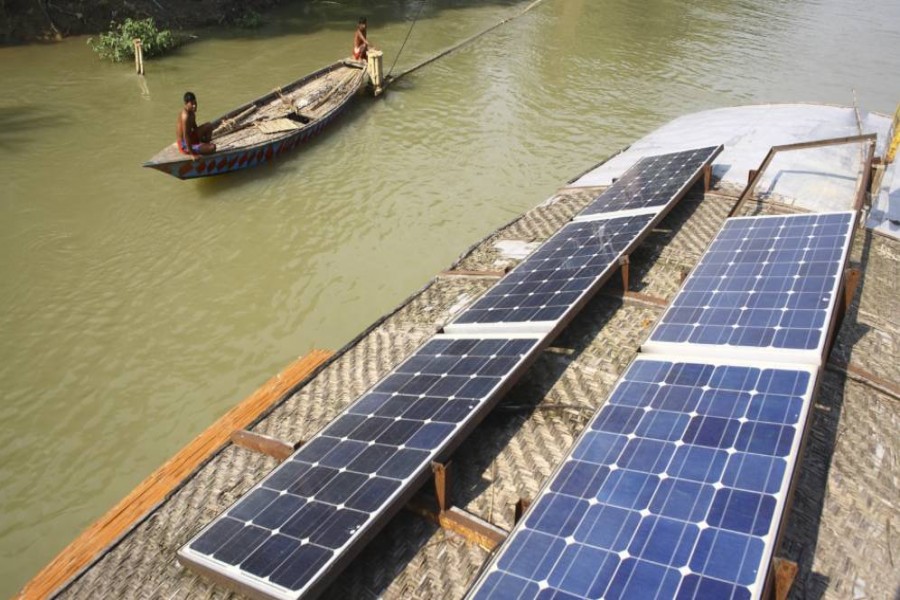Nowadays across the world, the burning question is addressing the energy crisis. Energy is a crucial component for any sort of economic development and for making sustainable economic growth renewable energy is the key. The other name for renewable energy is clean and green energy.
The green energy transition can reduce greenhouse gas emissions by 50 per cent. Bangladesh is highly dependent on non-renewable energy which is one of the main sources of greenhouse gas emissions. In Bangladesh, 63 per cent of fuel oils are used in the transportation sector, 15 per cent in agriculture, and 10 per cent in power sector. Hence, first and foremost Bangladesh needs to minimise the usage of oil in the transportation sector.
Many countries are trying relentlessly to diminish car travel due to emission and increase the quality of life. For example, Ljubljana (capital of Slovenia) has created a history of transforming a car-free paradise. By improving public transportation and limiting the usage of cars they have managed up to 70 per cent of carbon emissions and pollution levels by 58 per cent. This idea is gaining popularity in other cities in Europe. The centre of Oslo is nearly car-free and 5.5km2 of central Paris will become car-free in 2024. Moreover, Munich, Brussels, and Copenhagen have car-free zones in their central districts.
In Bangladesh it is virtually not possible to eliminate cars from all cities. The most effective and appropriate method for using less fossil fuel and less emission from the transportation sector is to encourage the usage of mass transportation.
Many questions are moving around our minds when we talk about mass transportation for its quality of service, safety, and affordability. Another big concern is why car riders will shift from cars to public transport. The government has to ensure more space in cities for public transport by an increase in budget for comfortable infrastructure which can retain and attract new riders for encouraging to use public transport. In the UK they have started to operate hydrogen-electric trucks and in the USA electric vehicles (EV) are gaining popularity. Globally, we have only 10 million EVs on the road. However, EVs across the world should be 230 million by 2030 to meet sustainable energy goals. Statistics showed that 6.60 million EVs were sold in the entire world last year-- that's only 10 per cent of all new car sales.
The good news is that it has started to happen as the US is set to invest $369 billion in energy security and climate change programmes aiming to reduce carbon emissions by 40 per cent within 2030. Chicago's 425 city-owned facilities will be powered with clean electricity by 2025. Sweden has already started to generate 56 per cent of its electricity from renewable sources. Several countries across the globe currently run 100 per cent clean electricity such as Iceland, Paraguay, and Albania. Our neighbouring country India is generating 37 per cent of the country's power from renewables.
Similarly, the Bangladesh government has declared BDT 26,066 crore budget for FY 2022-23 on energy supply security and renewable energy generation. Currently, Bangladesh generates only 3.08 per cent energy from renewables.
Solar energy is an easily accessible energy resource. Sunlight that strikes the earth's surface every 90 minutes fulfills the planet's total energy needs for a whole year. Moreover, the installation cost of solar panels has fallen by 89 per cent in the last decade. China is the world solar energy leader with over 340GW installed capacity. Europe, US, and China are planning to put solar farms in space for uninterrupted sunlight and more efficient way of harvesting energy. Portugal just built a huge floating solar park and it is the size of four football pitches containing 12000 solar panels. The EU is launching a major rollout of solar power as it tries to wean itself off Russia's fossil fuels. They have a plan to install rooftop solar panels on all suitable public buildings by 2025.
Bangladesh needs more renewable projects to decarbonise and meet the energy crisis. Most importantly to reduce import costs for fossil fuels to tackle economic downturn and keep all economic activity alive. Production and supply chain is hampering as all factories need to remain closed one day each week.
Md. Masud Rana is a Credit Analyst at United Finance Limited. [email protected]


